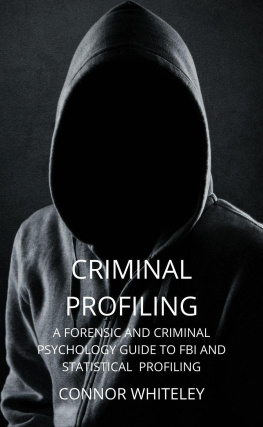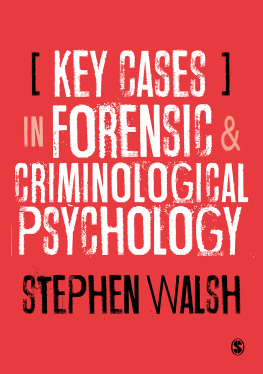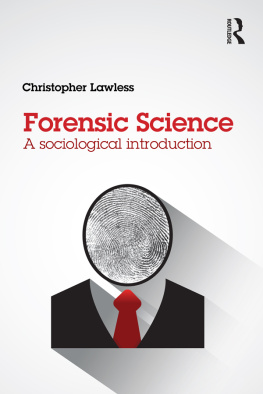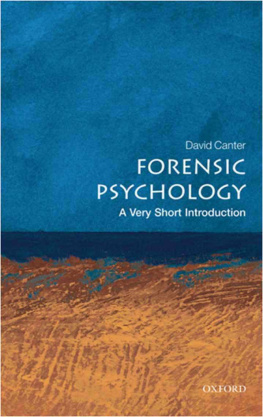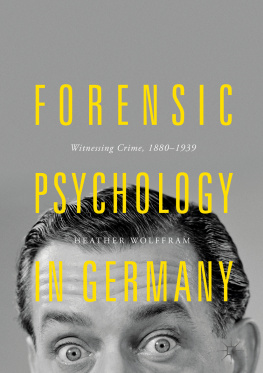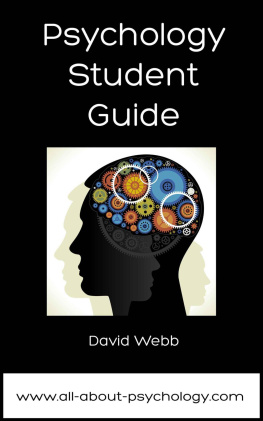
A clear and articulate road trip through forensic psychology with a stop or two along the way to debunk some common myths.
Carla Chivers, Newcastle University, UK
A fresh and unique pedagogical take on forensic psychology. This textbook offers a nuanced deep-dive into the most central themes of the field. Combining the latest research with the critical questions students and practitioners wrestle with, it makes for a truly engaging reading and learning experience!
Tom Pakkanen, bo Akademi University, Finland
An up-to-date, comprehensive and clear introduction to all the key areas in forensic psychology. The use of case studies and discussion questions encourage critical thinking and brings home the fact that our science has real world impact.
Steven Watson, University of Twente, The Netherlands
This is a great book which covers many important forensic issues.
Paul Valliant, Laurentian University, Canada
FORENSIC
PSYCHOLOGY
FACT AND FICTION
THOMAS DAVIS

Thomas Davis, under exclusive licence to Macmillan Education Limited 2021
All rights reserved. No reproduction, copy or transmission of this publication may be made without written permission.
No portion of this publication may be reproduced, copied or transmitted save with written permission or in accordance with the provisions of the Copyright, Designs and Patents Act 1988, or under the terms of any licence permitting limited copying issued by the Copyright Licensing Agency, Saffron House, 610 Kirby Street, London EC1N 8TS.
Any person who does any unauthorized act in relation to this publication may be liable to criminal prosecution and civil claims for damages.
The author has asserted their right to be identified as the author of this work in accordance with the Copyright, Designs and Patents Act 1988.
First published 2021 by
RED GLOBE PRESS
Red Globe Press in the UK is an imprint of Macmillan Education Limited, registered in England, company number 01755588, of 4 Crinan Street, London, N1 9XW.
Red Globe Press is a registered trademark in the United States, the United Kingdom, Europe and other countries.
ISBN 978-1-352-01121-0 paperback
This book is printed on paper suitable for recycling and made from fully managed and sustained forest sources. Logging, pulping and manufacturing processes are expected to conform to the environmental regulations of the country of origin.
A catalogue record for this book is available from the British Library.
A catalog record for this book is available from the Library of Congress.
Publisher: Luke Block
Associate Development Editor: Sophiya Ali
Cover Designer: Laura de Grasse
Production Manager: Georgia Park
Marketing Manager: Helen Jackson
BRIEF CONTENTS
CONTENTS
LIST OF FIGURES
LIST OF TABLES
LIST OF FEATURES
CASE STUDIES
GLOBAL PERSPECTIVES
APPLY IT
ABOUT THE AUTHOR
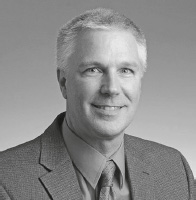
Thomas Davis PhD is a Professor of Psychology and the Psychology Program Chair at Nichols College, Dudley, Massachusetts. He has over two decades of teaching experience in forensic psychology. Originally specialising in cognitive neuroscience, he has cultivated interests in the application of psychology to enhance human memory, the effects of video games on social and intellectual development and all things related to biological psychology. Recipient of the Stansky Distinguished Professor Award, his primary focus is teaching and learning from his students. He lives in Connecticut with his wife where they enjoy exploring the outdoors together.
TOUR OF THE BOOK
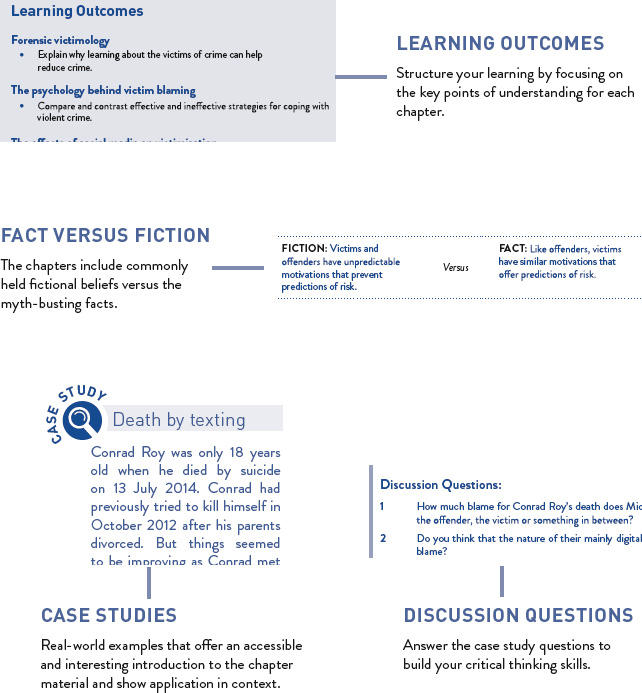
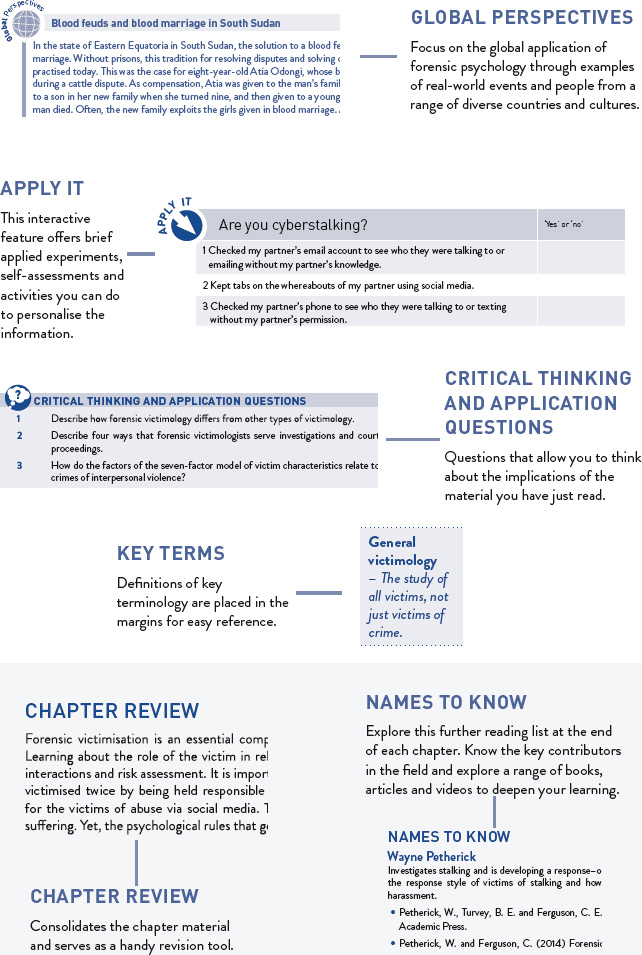
DIGITAL RESOURCES

Go online to the companion website for this book to access a suite of teaching and learning materials: www.macmillanihe.com/Davis-Forensic-Psych
Accompanying this book is a comprehensive suite of supportive resources to help both students and instructors get the most out of their learning and teaching.
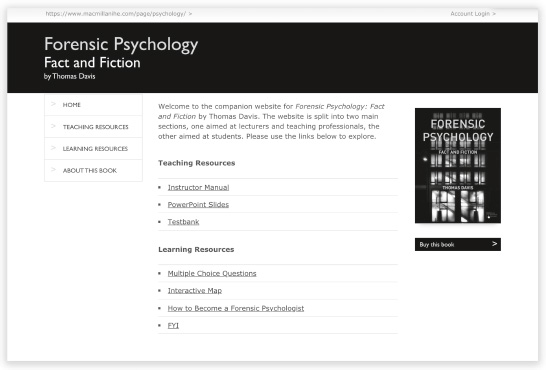
Resources to help instructors teach with the book include:
Instructor manual: A useful guide on how to strategically plan lessons and advice for the novice to the advanced instructor. This manual also includes a range of activities and resources for instructors to use in class.
Lecture slides: Detailed PowerPoint slides that map on to each chapter in the book.
Lecturer test bank: Contains over 300 multiple-choice questions and essay questions targeting key ideas in the book. Instructors can select those relevant for their course for use in formative or summative assessments.
Students can benefit from the following resources:
Student test bank: An interactive bank of 260 multiple-choice questions to check your knowledge and understanding of each chapter.
Spotlight map: An interactive 3D map that allows you to compare key information and statistics on crime around the world.
How to become a forensic psychologist: Explore the pathways to becoming a forensic psychologist in different territories across the globe.
FYI: Interesting material that answers frequently asked questions from students related to the chapter material.
PREFACE
Sic parvis magna, Latin for greatness from small beginnings, was the motto of renowned explorer sir Francis Drake (154096). Like Drakes motto, the humble origins of this textbook came from a small beginning the simple search for the truth.
The truth matters. Psychology is built on the principles of the scientific method and sceptical thinking. As a psychology professor, I care about the truth, because rational behaviour begins with knowing the truth. We sometimes make decisions based on things we want to believe are true rather than considering the real state of the world. When the truth is buried under a mountain of misrepresentations, we cannot make wise decisions. This is because pseudoscience and superstition prevent us from seeing the world as it really is. We believe in myths because they provide easy answers, defy analysis and give us a false sense of emotional security. However satisfying and reassuring our false beliefs are, it is better to see the world as it really is. For example, believing that punishment is the most effective means to control behaviour has led to increased violence and crime. Pressuring people to tell the truth has sometimes led to false confessions. Discovering that there is no ultimate truth machine that reveals lies offers new opportunities to try more effective methods of finding the truth.



